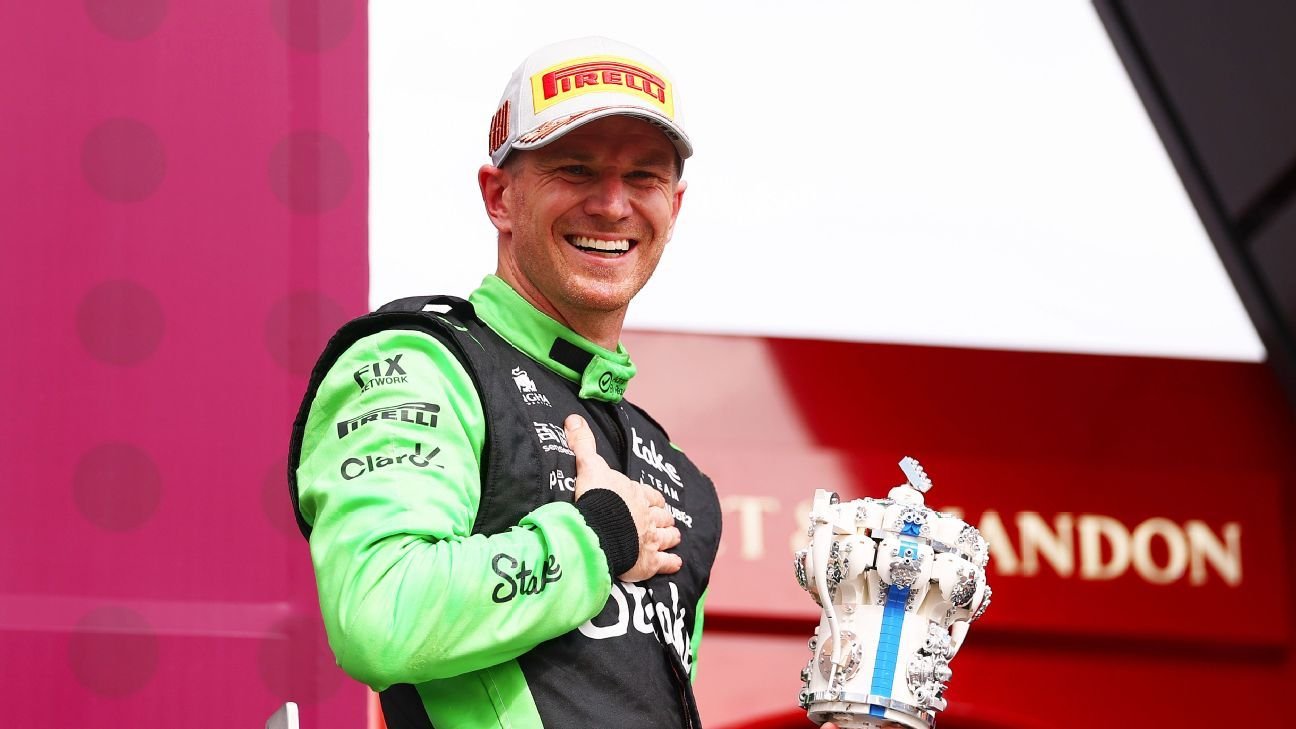SILVERSTONE, England — “Cometh the hour, cometh the man.”
Nico Hülkenberg waited years for his moment. On Sunday, he finally got it: the German scoring his first Formula 1 podium and ending one of the sport’s most infamous and unfair records.
Sauber boss Jonathan Wheatley had stepped out of the team’s garage party to fulfill media duties when he said those words. Behind him, champagne-soaked team members broke into chants of “Nico’s on fire” through the garage walls.
Sauber hadn’t gone to Silverstone expecting a party — the idea of a podium would have seemed ludicrous to anyone with even a passing knowledge of F1. The Swiss team had not finished in the top three since the 2012 Japanese Grand Prix. In the midst of transitioning to Audi ahead of a full rebrand in 2026, Sauber finished dead last in the constructors’ championship last year without scoring a single point. The team had so little champagne in their fridges that Mercedes and Aston Martin brought over extra bottles just so they could celebrate properly.
While Sauber had forgotten what it felt like, Hülkenberg could have been forgiven for thinking he might never get to feel it at all.
His maiden F1 podium came at the 239th attempt, 15 years after his debut at the 2010 Bahrain Grand Prix. The man who for so long had been known as “the man with the most race starts without a podium to his name” had flipped his legacy in one stunning afternoon when team and driver had combined perfectly to snatch the most unlikely of results. Genuine surprises are a rarity in Formula 1, but this was as good of an example as you could ever find.
“It’s been a long time coming, hasn’t it,” a stunned Hülkenberg said immediately after the race. “But I always knew we have it in us, I have it in me, somewhere.”
Not everyone would have agreed.
The German driver’s failure to score even one podium — with several big opportunities squandered over the years, such as Brazil 2012 or Germany 2019 — had been a stick critics had used to beat him with for years. Most in the paddock found it hard to fathom how a driver as good as Hülkenberg could have been that punching bag.
Ex-Red Bull sporting director Wheatley only became Hülkenberg’s boss on April 1 but, like many in the paddock, has been convinced of his driver’s talent far longer than that.
“It seems incredible to me that we’re all celebrating a podium, as it feels to me like he should have been getting them all his career,” Wheatley said. “It seems to be the longest-waited podium ever. He showed his class today, didn’t put a wheel wrong. I’ve considered him to be an extraordinary talent for a very long time, and I think I’ve been consistent in saying that to everyone here. It seemed incredible to me that he’s never achieved a podium in his career. I think he showed today what he’s capable of.”
Hülkenberg’s previous futility in that department had been hard to fathom.
Every sport has its statistical outliers, the athletes who did not quite achieve something they could or should have done. In Formula 1, a pole position is perhaps the first achievement of any value — Hülkenberg had one of those in his rookie season, at the 2010 Brazilian Grand Prix, a performance that appeared to vindicate the massive hype that accompanied his early racing career — but in terms of race results, the podium is the bare minimum for a racing driver of any real significance. Grand prix victories follow for great drivers. A world championship for the few elite talents. Plenty of good drivers retire without either of the latter.
Even Formula 1’s most famous “nearly men” had boasted otherwise-impressive résumés. In fact, some are better remembered because of their near misses. Stirling Moss, often described as the greatest driver never to win a world title, claimed 16 race victories. Rubens Barrichello took 68 podiums but never the championship. Nick Heidfeld managed 13 podiums without ever standing on the top step. They all hit at least one of the milestones that matter.
Hülkenberg, somehow, hadn’t. Until Sunday. It was a baffling anomaly. Here was a driver good enough to have started more than 200 races over 15 seasons, good enough to win the 24 Hours of Le Mans (one of motorsport’s ultimate prizes) in his first and only attempt in 2015.
He had been something of a phenom in junior categories. In karting, Hülkenberg regularly beat another young German of the same age: Sebastian Vettel, who would go on to win four world championships.
On his arrival to Formula 1 with Williams, Hülkenberg had been considered one of the coming men of motor racing; he had dominated Formula BMW in 2005, won the short-lived A1GP championship, and then taken a comprehensive title in GP2 — now Formula 2 — in 2009. He referenced his early success on Sunday evening in the news conference for the top three finishers.
Asked how it had felt to be on the podium again after so long, he said: “Felt good. I still remembered how to do it! Used to do it a lot in the junior stuff and then had to wait for it quite a bit.”
No one in the paddock ever doubted Hülkenberg’s talent. His long wait for a podium wasn’t just cruel, it baffled those who raced alongside him. Reigning champion Max Verstappen was seen pumping his fists in celebration at Hülkenberg as he passed the Sauber at the conclusion of the race. The Red Bull driver, a good friend of Hülkenberg’s, was quick to point out how overdue it was.
Those who had shared a car with him knew what he was capable of.
“For me, he’s always been a top-five driver every time he’s been in F1,” said former Renault teammate Carlos Sainz. “His race execution is incredible. I’m glad he has this podium to shut everyone up. I never doubted him.”
Two-time world champion Fernando Alonso, no stranger to the importance of competitive machinery in defining the success of a Formula 1 career, said: “He’s one of the best drivers on the grid that never had the opportunity to have a proper car underneath him.”
Perhaps the only person who wouldn’t have been entirely thrilled with Hülkenberg’s big moment on Sunday was Adrian Sutil, who now inherits the record for the most F1 race starts without a podium. The number next to Sutil’s name: 128. Hülkenberg’s had stood at 292. A gap so vast it underlines just how absurd it was that he had to wait so long.
The machinery point Alonso alluded to was the worst part of the Hülkenberg story — the chips never seemed to fall in the right place. After Williams, he raced for minnows Force India and might have won them the 2012 Brazilian Grand Prix — or at the very least scored a podium — had he not collided with Lewis Hamilton in the final part of the race. His standout performances for an uncompetitive Sauber in 2013 turned heads in the paddock. He was seriously considered as Felipe Massa’s replacement at Ferrari, only to be passed over in favour of returning world champion Kimi Räikkönen — a sliding doors moment if ever there was one.
Force India boss Vijay Mallya brought Hülkenberg back in 2014 alongside Sergio Pérez, but that partnership only deepened the frustration. Across their time together, Force India scored four podiums — every single one belonged to Pérez. The most painful was Monaco 2016; a poorly timed pit stop left Hülkenberg trapped in traffic while Pérez jumped ahead and finished third.
A move to Renault, an outfit with world title ambitions, followed, but the team never came close to achieving those goals. Here came another painful moment. If Brazil 2012 was the one that got away, Germany 2019 wasn’t far behind. In the rain at Hockenheim, Hülkenberg had been running at the front when he aquaplaned off the circuit and out of the race. “It hurts and it’s going to hurt even more tomorrow,” he said after that race. Worst of all was that, by then, he already held the record for the most starts without a podium. That moment appeared to sum why in a nutshell.
That moment was also the backdrop for one of my own most uncomfortable moments as a journalist. Four days later, at the media day for the next race in Budapest, I asked him directly whether that unwanted record played on his mind when he found himself in strong positions. He glared at me.
“Does it weigh heavily on you?” he snapped back. I reminded Hülkenberg we were talking about him. He stared, letting an excruciating silence hang in the air for what seemed like an eternity, as if disgusted the question had even been asked. The reaction made sense. He was sick of the narrative. But the reason it was asked so often was precisely because he was so clearly good enough. The record lingered and it didn’t make sense to anyone associated with the sport.
Even on Friday ahead of this British Grand Prix, a fellow journalist interviewed Hülkenberg and asked him whether his record-breaking utility still bothered him. Hülkenberg, by now with a different perspective as a father and a man enjoying his second stint in Formula 1 after a brief spell as a super-sub in 2020, 2021 and 2022, brushed it off.
“It’s like a cold cup of coffee,” he quipped.
Hülkenberg never has to hear that question again. Given Sauber’s recent form — the team has outscored Red Bull in the past four races and is up to sixth in the championship — and the growing buzz around the conversion to Audi in 2026, the celebratory days might only just be beginning for him.
#doubted #toasts #Hülkenbergs #podium



